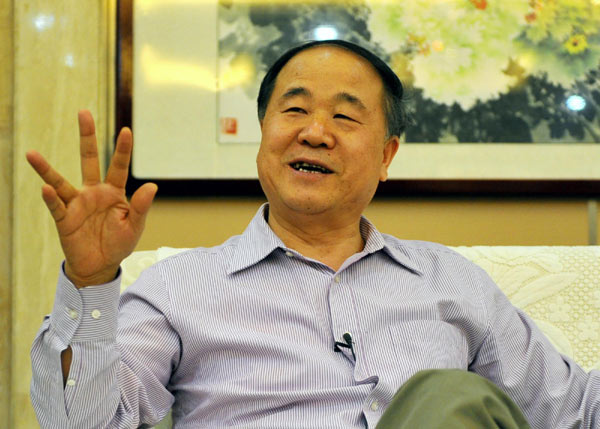GAOMI, Shandong - Nobel Literature Prize winner Mo Yan said Friday that eyes worldwide will read Chinese contemporary literature over a period of time.
"It (my winning the prize) should play a rather positive role, but the effect shouldn't be overestimated," Mo said in an exclusive interview with Xinhua in his hometown Gaomi in east China's Shandong province.
Mo became the first Chinese national to win the Nobel Literature Prize in its century-long history Thursday, bringing joy to other writers and readers throughout the country.
 |
|
Mo Yan speaks to Xinhua reporters during an interview in his hometown Gaomi county, East China's Shandong province, Oct 12, 2012. [Photo/Agencies] |
No high expectation for winning
The 57-year-old said he did not have high expectations for winning. "Actually, I thought I only had a slim chance to win," he said.
"There are so many good writers throughout the world, and in China. It's like I was standing in a long queue for a prize that is only awarded to one person in the world annually."
He said the permanent secretary of the Swedish Academy informed him of the win through a phone call, 20 minutes before the news was publicly announced.
Obsessed with reading in childhood
Mo, who was born into a farmer's family in a village and dropped out of school at the age of 12, started reading books in a mill of his house using the flickering light of an oil lamp as he did not want to work in the field.
"In my childhood, there were only a few books available in my village. I had to resort to every means to find a book to read. I traded books with others and even churned the mill and reaped wheat for others in exchange for books," he said.
"When I finished reading all the books available in villages around, I thought I was the most knowledgeable man in the world."
"With no more books at hand, I even started reading a Chinese dictionary. I read it so many times that I even found mistakes in it."
Limited effect in reversing reading decline
"With more means available to pass one's spare time now, such as chatting online and listening to music, one's reading time will definitely end up shorter," Mo said.
Mo said he did not expect his Nobel Prize in Literature to boost Chinese people's reading habits despite the buzz his winning has created.
"I think the mania will end in one month, maybe even sooner and then everything will be back to normal," said the Nobel laureate.
A survey by the Chinese Academy of Press and Publication showed that in 2011, an average Chinese person read 4.3 books a year, far fewer than the average in Western countries.